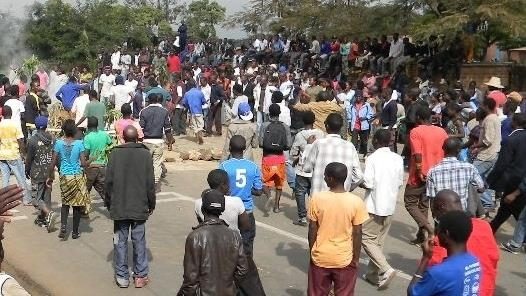LILONGWE, Malawi
Police in Lilongwe on Monday used tear gas shells to disperse protesters demanding the resignation of the energy minister amid a fuel shortage in various regions that has hit Malawi hard for a month.
Protesters took to the streets early in the morning, chanting anti-government slogans and waving placards to express their anger over the fuel shortage.
However, in less than an hour, police officers arrived at the Lilongwe Community Centre in the heart of the capital city and used tear gas canisters to disperse the protesters.
So far, no casualties or arrests have been reported.
The Centre for Democracy and Economic Initiatives (CDEDI) had given the protest call, which was fully supported by the powerful umbrella body for religious organizations, the Public Affairs Committee (PAC), as well as opposition political parties, the United Transformation Movement (UTM) and the Democratic Progressive Party (DPP).
Protesters’ main demand was that Energy and Mining Minister Ibrahim Matola and Chief Executive of Malawi Energy Regulatory Authority (MERA) Henry Kachaje resign for failing to address the situation.
CDEDI Executive Director Sylvester Namiwa denounced police action as “barbaric and brutal,” vowing to continue the protest until their demands are met.
“We will not be deterred by any form of violence or brutality directed at us by any individual. We have complete legal rights to protest. Any attempt to impede our efforts is illegal,” Namiwa told Anadolu, adding, “This is a peaceful demonstration, and we are determined to continue with or without violence or disruptions.
For nearly a month, the country has been experiencing a critical fuel shortage, which has crippled essential services such as public transportation and hospitals, where power generation is dependent on fuel, exacerbating people’s frustrations.
The government, on the other hand, has attributed the “fuel crisis” to low supply levels, which have been exacerbated recently by the country’s nearly four-year foreign exchange (forex) shortage.
Malawi, a landlocked country, gets its fuel supplies from Gulf countries via Tanzania.
Consumer rights activist John Kapito described the country’s fuel shortage as “a blatant violation of people’s basic rights.”
“As a nation, we cannot allow this to continue. Innocent people are being subjected to unnecessary suffering,” Kapito told Anadolu, stressing that “the government should do something to find a long-term solution to this problem.”






